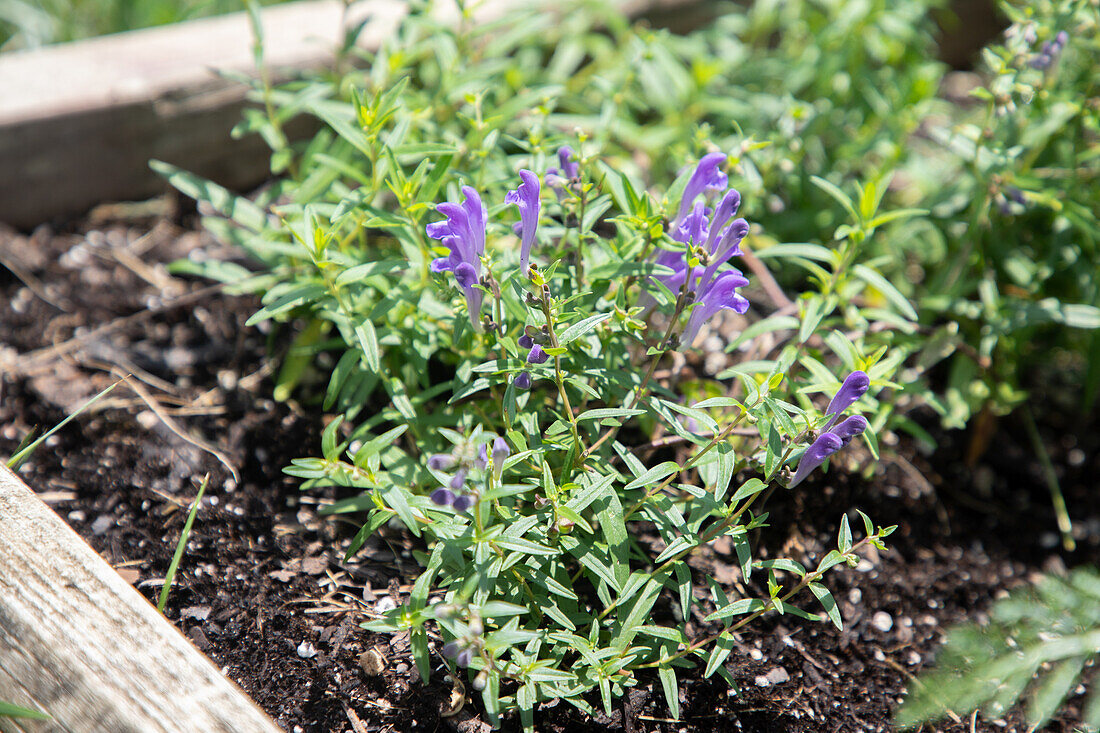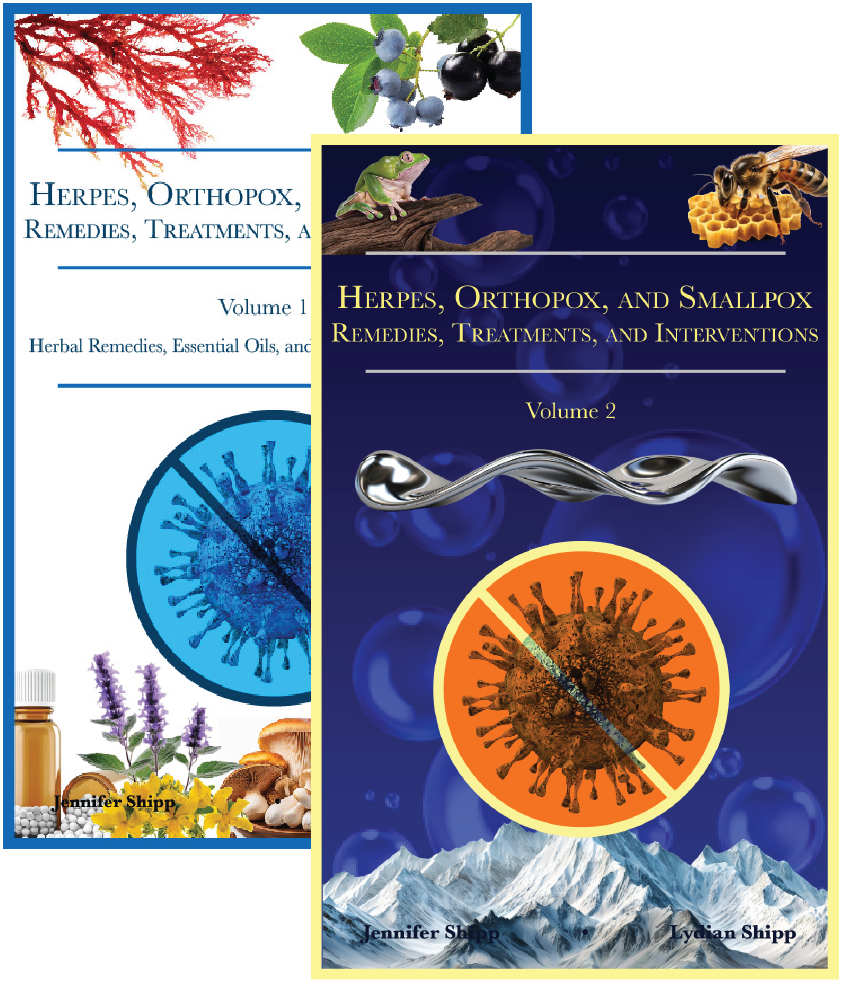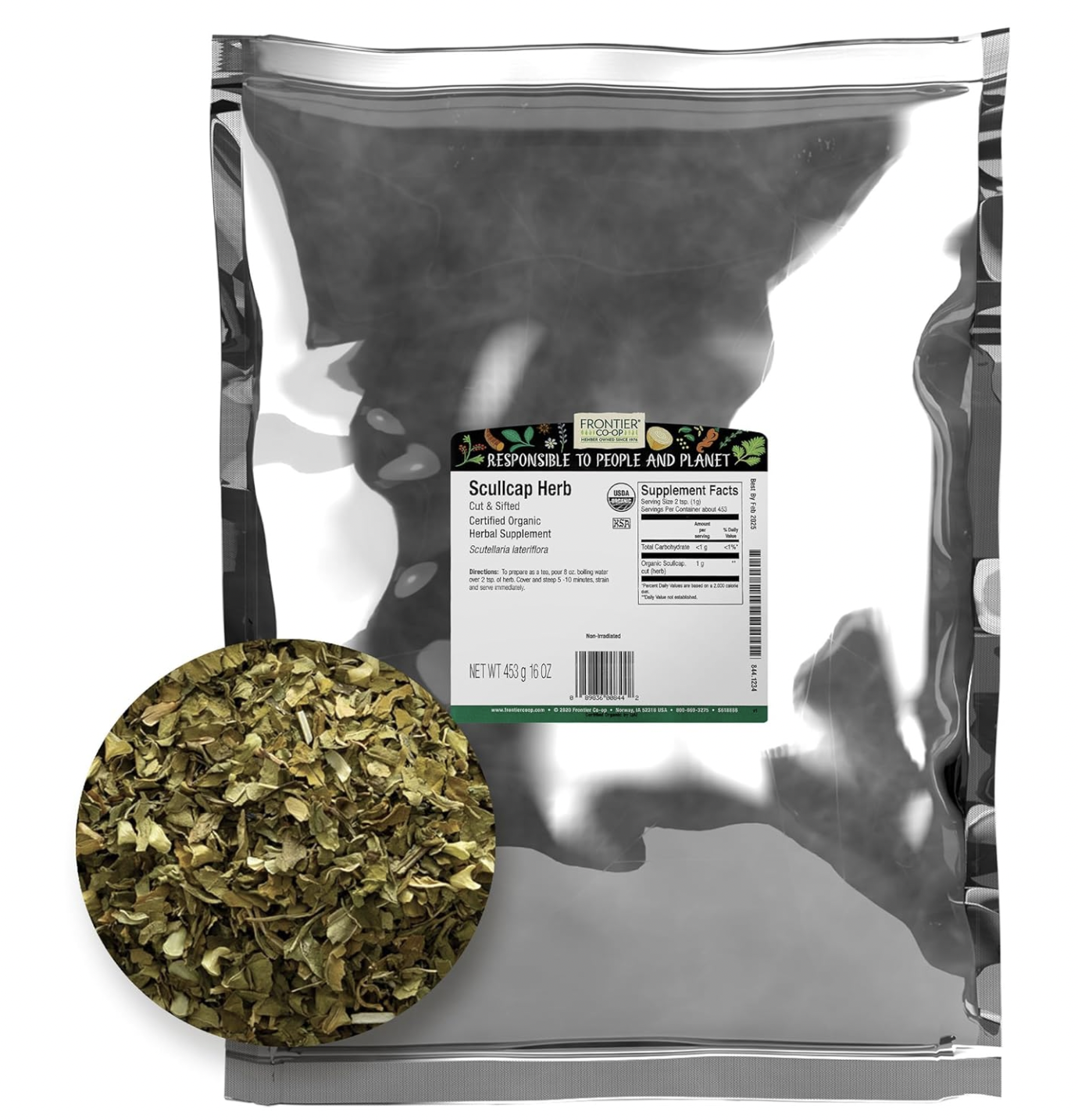
How to Use Skullcap for Viral Infections
NOTE: Skullcap should generally be avoided during pregnancy because it has been known to cause miscarriage, especially during the early stages of pregnancy. Skullcap can inhibit pituitary and chorionic gonadotropin hormones that are necessary to maintain a healthy pregnancy.Women who are breastfeeding should use this herb with caution since it has been known to lower prolactin levels in some cases, thus potentially lowering milk supply.
Two main compounds in Scutellaria, Baicalein and Wogonin, have powerful antiviral effects and can be used to treat most strains and types of herpes viruses. I’ve discussed these two compounds separately below.

Baicalein for HSV-1, HSV-2, and HHV-6
Baicalein, an important flavonoid compound found in Scutellaria species plants, specifically has the ability to inhibit HSV-1 and Human Herpesvirus Type 6 (HHV-6). This flavonoid may be largely responsible for skullcap’s antiviral activity.One animal study found that baicalein is able to inhibit viral replication of various strains of HSV-1, including some acyclovir-resistant strains. In a mice model of ocular HSV-1 infection, the administration of baicalein was found to effectively reduce replication of the HSV-1/F viral strain in addition to reducing inflammatory storm and virus-induced histological changes to the cornea. When administered intranasally, baicalein also successfully reduced HSV-1 viral loads in the nose and trigeminal ganglia in infected mice.
Baicalein has also been found to act against Human Herpesvirus Type-6 (HHV-6) in vitro. This is especially relevant in terms of treating children, since more than 90% of children experience an infection with HHV-6 before age 2, and skullcap is a safe and effective herbal remedy for children of all ages, including infants. In fact, one in vitro study showed that Baicalein is more effective in preventing viral absorption than Valaciclovir, an antiviral drug commonly used to treat and manage herpes infections.
Other in vitro studies have also demonstrated that baicalein can effectively inhibit HSV-1 viral replication; this mechanism of action is thought to be due to baicalein’s ability to inactivate the herpesvirus particles and to inhibit IKK-β phosphorylation.
 Click here to buy Hawaii Pharm's Chinese Skullcap Tincture
Click here to buy Hawaii Pharm's Chinese Skullcap Tincture
Wogonin for HSV-1, HSV-2 and Varicella Zoster
Wogonin, a different compound in Scutellaria, has activity against both HSV-1 and HSV-2, as well as against varicella zoster (the causative agent behind shingles and chickenpox). As an antiviral agent, Wogonin specifically works by suppressing viral replication of these various types of viruses. It is also known to be neuroprotective, anti-tumor, anti-inflammatory, and anxiolytic according to recent research.As a treatment for herpes zoster, Wogonin has been shown in vitro to inhibit varicella-specific gene expression as well as to reduce viral presence in viral titers. The antiviral activity of this flavonoid-like compound is thought to be a result of its ability to induce type 1 IFN signaling, cause an increase in phosphorylation of STAT (signal transducer and activator of transcription protein), and inhibit the phosphorylation of AMPK (AMP-activated protein kinase). The inhibition of AMPK phosphorylation specifically acts to reduce viral replication in vitro. Wogonin may also act to treat herpes zoster by inhibiting the body’s inflammatory responses, thus potentially relieving some uncomfortable symptoms of the infection.
Other in vitro studies have found that Wogonin acts against HSV-1 and HSV-2 by blocking viral replication and protein expression. It may also interfere with the herpes virus’s life cycle after cell entry by interfering with the step between viral entry into a healthy cell and viral genomic DNA replication. To be specific, Wogonin is thought to suppress IE gene expression of the herpes simplex virus, thus also interrupting expression of E and L genes later on.
In the treatment of HSV-2 in particular, Wogonin was shown to inhibit viral activation of the NF-κB pathway. This pathway is necessary in order for host cell death to occur in the early stages of viral infection; it not only is essential for herpes virus invasion (including HSV-1, HSV-2, varicella zoster, and Epstein-Barr virus), but also for the invasion of certain other viruses into host cells, such as the hepatitis B and C viruses, HIV-1, and RSV.
Support our outside vendors - Buy Hawaii Pharm's American Skullcap Tincture Here.
Skullcap as a Treatment for Varicella zoster Virus / Human Herpesvirus-3 (HHV-3)
Topical Scutellaria baicalensis for Herpes Zoster Skin Lesions
One Chinese study found that the topical administration of Scutellaria baicalensis root was able to more effectively treat herpes zoster skin lesions than topical nitrofurazone. The pain levels and healing times were significantly less in patients who were treated using topical skullcap treatments than those who received the conventional treatment.Scutellaria for Chicken Pox
One source recommends the use of skullcap as part of an herbal chicken pox remedy. ¼ to ½ teaspoon of skullcap tincture should be given as needed, along with giving regular baths with either oatmeal, comfrey, burdock root, sea salt, or baking soda. 1-2 drops of German chamomile, tea tree, and/or lavender essential oils can also be added to the bath. After each bath, an herbal healing salve should be applied to treat sores. Click here to buy loose leaf Scutellaria lateriflora tea.
Click here to buy loose leaf Scutellaria lateriflora tea.
Other Viral Infections That Scutellaria Treats
Wogonin and Baicalin are both found in relatively high quantities in most Scutellaria species plants, including both Scutellaria lateriflora and Scutellaria baicalensis, the two most common types of skullcap. Baicalin has also been shown to have antiviral activity against the Dengue virus, Zika virus, Chikungunya virus, Influenza virus, and Coxsackie-B virus. Wogonin may also have antiviral effects in the treatment of hepatitis B virus (HBV), vesicular stomatitis virus (VSV), human papillomavirus (HPV), and respiratory syncytial virus (RSV).Below is a list of the viral infections that Skullcap The Plant has been known to effectively treat:
- Rabies Virus
- Viral Hepatitis
- HIV-1
- Tick-Borne Encephalitis
- Newcastle Disease Virus (when combined with Astragalus root and Anemarrhena root in a ratio of 1 part Scutellaria baicalensis to 1 part Astragalus and 2 parts Anemarrhena)
- Dengue Virus
Scutellaria for Influenza-A
5,7,4'-Trihydroxy-8-methoxyflavone, a flavonoid found in Scutellaria, was found to be especially effective as a treatment for Influenza A through the reduction of viral replication in MDCK cells. This flavonoid reduced viral replication by prevengin the fusion of the Influenza-A virus with endosome/lysosome membranes in the early stages of infection, and by inhibiting the budding of viral progeny from the surface of host cells.Scutellaria baicalensis for Hand-Foot-and-Mouth Disease / Enterovirus-71 Infection in Children
One 2016 study found that the administration of Scutellaria baicalensis injections in pediatric populations under 1 year of age could quickly relieve fever caused by hand-foot-and-mouth disease in addition to healing oral lesions, skin rash, and nervous system involvement caused by the virus. In this study, S. baicalensis performed significantly better than the recommended conventional medicine for enterovirus-71 infections, Ribavirin. Although a few patients from both groups still exhibited some lingering signs of nervous system involvement post-infection, the patients in the Chinese skullcap group exhibited significantly fewer, and less severe, neurological symptoms than those who had received conventional treatment.The study mentioned above was carried out in infants under 1 year of age, but researchers observed that the Chinese skullcap injections were generally more effective in older babies. This suggests that Scutellaria baicalensis, although safe and effective in young infants, still works and may in fact work better in toddlers and young children.
 Click here to buy Chinese skullcap capsules.
Click here to buy Chinese skullcap capsules.
How to Administer Skullcap as a Herpes Treatment
There are a few different kinds of skullcap, with Scutellaria lateriflora, Scutellaria baicalensis, and Scutellaria barbata being the three most common varieties. The first two are the most common; S. lateriflora is more common in North America, while S. baicalensis is more common in Asia and used frequently in Traditional Chinese Medicine herbal preparations. Both contain similar compounds and can be highly effective herbal medicines, but keep in mind that S. lateriflora is usually thought to be more gentle (and thus, some schools of thought indicate it more readily for infants in children; in reality, both of these varieties can be used safely in children when dosed appropriately).Click here to learn more about Skullcap and how to dose and use this herbal medicine effectively.
Resources:










